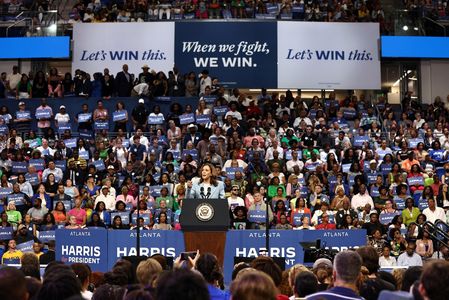Kamala Harris will soon name and hit the road with her running mate, but in the meantime, she's taking the fight directly to Donald Trump. Just this week, the former president questioned her racial identity and is struggling to find a way to stop Harris’s momentum.
Clip: Sizing up the political benefits and disadvantages of a running mate selection
Aug. 02, 2024 AT 9:09 p.m. EDT
TRANSCRIPT
Notice: Transcripts are machine and human generated and lightly edited for accuracy. They may contain errors.
JEFFREY GOLDBERG: We're all waiting to find out who Kamala Harris picks as vice president. The solidifying conventional wisdom in our city is that it's Josh Shapiro's to lose the governor of Pennsylvania. Talk for a minute about his positives and negatives on this ticket. Let's start with Elisabeth.
ELISABETH BUMILLER: Well, his positives are he's the governor of Pennsylvania and that she has to win Pennsylvania.
JEFFREY GOLDBERG: There's no way for Kamala Harris to win the presidency without Pennsylvania, in a plausible way?
ELISABETH BUMILLER: Well, no. That's the -- yes. And he's a very popular Democratic governor and he is well-spoken, he's good on the stump, he's smart.
On the other hand, I'm just going to repeat what the former president said today, that, well, he's Jewish. And that means that she --
JEFFREY GOLDBERG: Former president, meaning Donald Trump, not Barack Obama or --
ELISABETH BUMILLER: No. He just put it right out there, just like he always does. And there is some concern that, you know, this will be a problem in Michigan with the Muslim groups who are -- Donald Trump said it, you know, the Palestinians who support Kamala Harris. I mean, he went so far as to, you know, again, playing this divisive strategy.
JEFFREY GOLDBERG: So playing philo-Semitic, but actually sort of baiting anti-Semites is what Trump's move was?
ELISABETH BUMILLER: I would say so, yes.
JEFFREY GOLDBERG: Okay.
ELISABETH BUMILLER: And so that's --
JEFFREY GOLDBERG: I mean, how serious is that as a challenge compared to the positives that he brings?
VIVIAN SALAMA: They're very enthusiastic about him so far, and they see his background politically and otherwise as something that could really help and bolster Kamala Harris' appeal to voters right now.
Obviously, the Republicans, as Elisabeth was saying, have been looking for ways to kind of find division and set them apart and kind of show voters why this candidacy couldn't work, this ticket couldn't work. But right now, there's a lot of enthusiasm. There are a number of other potential candidates, but it seems that Governor Shapiro, so far, is in the lead, and he's very popular.
JEFFREY GOLDBERG: Steve, the assiduous reporter that you are, you spend a lot of time talking to voters in Pennsylvania.
STEVE INSKEEP: I did.
JEFFREY GOLDBERG: Give us a sense of why Shapiro is popular in his state, much more popular than Joe Biden.
STEVE INSKEEP: Well, why he's popular, he's taken what are seen as more moderate positions or more realistic positions that fit with voters in Pennsylvania. People in Pennsylvania are worried about security. Shapiro had a different view of protests and of law enforcement than perhaps some other Democrats have had in the last couple of years. And people have responded to that.
I think of one voter I spoke with in Pennsylvania in particular, and she said, genuinely undecided, registered Republican. Is generally against abortion, nevertheless thinks Republicans are too extreme on abortion, would like to vote for a Democrat. She said she wasn't sure she could vote for a woman for president, but then went on to say, this registered Republican, that Shapiro on the ticket would help.
There are Republicans that you can run into in Pennsylvania who like this Democrat, and that is such an extraordinarily rare thing to encounter anybody going across party lines.
ELISABETH BUMILLER: Can I ask you a question why she couldn't vote for a woman for president?
STEVE INSKEEP: She said things that I've heard from other people, and this is out in America. I am reporting to you what I hear from some --
ELISABETH BUMILLER: No, I don't doubt it. I don't doubt it.
STEVE INSKEEP: Her concern is --
JEFFREY GOLDBERG: We don't shoot the messenger here on PBS.
STEVE INSKEEP: Her concern is like that personal nature of being in the room with all these men. Will they respect her? Will they treat her as an equal?
My first thought is if you have the power, they're going to be forced to treat you as an equal. But this voter and other people that I've talked with wonder how those interpersonal relations are going to work.
JEFFREY GOLDBERG: Is she familiar with the life and work of Nancy Pelosi?
STEVE INSKEEP: I could have brought it up. I could have brought it up.
JEFFREY GOLDBERG: Yes.
ANNE APPLEBAUM: There were people who said that about Barack Obama, you know, would a black leader be respected by other people around the world? I heard people say that at the time.
JEFFREY GOLDBERG: Steve, you brought up abortion as an issue, and let's talk about J.D. Vance for a minute. He's had an interesting, mixed week as a candidate. People are finding different things that he said over the years that don't make him popular. Let me just be diplomatic about it.
STEVE INSKEEP: He was talkative on podcasts.
JEFFREY GOLDBERG: He made the mistake of going on podcasts and talking a lot. There's one podcast that just came out, 2021. He was asked, should a woman be forced to carry a child to term after she's been the victim of incest or rape. And he answered, look, my view on this has been very clear and I think the question betrays a certain presumption that's wrong. It's not whether a woman should be forced to bring a child to term, it's whether a child should be allowed to live, even though the circumstances of that child's birth are somehow inconvenient or a problem to the society.
So, here he's arguing against, seemingly, the incest or rape exception. I've got to imagine that this is not -- this kind of view is not making people happy at Trump headquarters.
ELISABETH BUMILLER: No, of course not. This is not -- I don't know. This was not a great pick. And it sounds like the former president, Donald Trump, thinks that himself, you know, when he was speaking to the NABJ convention, he went so far as to say, well, it doesn't matter who's on the ticket as vice president. It doesn't matter. So, that is what he now thinks of his vice presidential pick, that doesn't matter, it's all about me.
No, he's had a terrible, terrible rollout, cat ladies, we can go on and on.
VIVIAN SALAMA: There's also another issue that J.D. Vance was still chosen when Biden was in the race.
JEFFREY GOLDBERG: Right, he was chosen in a Biden environment.
VIVIAN SALAMA: In a Biden environment where also coupled with the fact that Trump believes that his vice presidential candidate really doesn't matter. Biden himself was uncomfortable with the discussion of abortion, the debate of abortion. His Catholic upbringing made it a very uncomfortable subject for him to tackle. Now, Kamala Harris is leading the ticket and it's a completely different race, particularly on this issue.
JEFFREY GOLDBERG: In the last couple of minutes, I want to go to Anne with something that Donald Trump said at the NABJ convention. It was not the thing that got the most attention but it had to do with January 6th, when he was asked whether he would pardon January 6th rioters, he said this.
UNIDENTIFIED FEMALE: My question is on those rioters who assaulted officers. Would you pardon those people?
DONALD TRUMP: Oh, absolutely, I would. If they're innocent, I would pardon them.
UNIDENTIFIED FEMALE: They've been convicted.
DONALD TRUMP: And, by the way, the Supreme Court just under -- well, they were convicted by a very tough system.
JEFFREY GOLDBERG: So, Anne, they were convicted because there was videos of them doing crimes, let's just put park that aside. I'm curious, interpreting what he said through the prism of what you understand about the autocratic mentality. What are you getting from that?
ANNE APPLEBAUM: So, he's getting people used to the idea that courts are politicized and can be manipulated, and that's okay, that's normal, that rule of law is malleable. And he's getting people used to the idea that there could be something different, rule by law, which is what happens in Russia and China and North Korea, which means that the leader decides what the law is, you know. And so I proclaim them innocent and so they are, and he is changing the way people talk.
JEFFREY GOLDBERG: And last question on this. Do the Democrats benefit from talking about his lack of fealty to democratic norms, or is that not a main issue in the next three months?
ANNE APPLEBAUM: I think they do, as long as they're also talking about the future and what will change and what will happen. You know, they can't run a campaign that's just about the past.
JEFFREY GOLDBERG: Right. And what would change in terms of January 6th? Do you think the American people will accept the pardoning of these January 6th rioters?
ANNE APPLEBAUM: Some people will and some people will find it profoundly offensive, and that it will be not yet -- and it would be an unbelievably, divisive issue, of course.
JEFFREY GOLDBERG: Well, unfortunately, we need to leave it there for now.
STEVE INSKEEP: Cheerful note to end.
JEFFREY GOLDBERG: Cheerful note, yes. I was trying to go up note, but here we are.
FROM THIS EPISODE


Clip: The geopolitical implications of the prisoner swap that freed Evan Gershkovich


Full Episode: Washington Week with The Atlantic full episode, 8/2/24

© 1996 - 2025 WETA. All Rights Reserved.
PBS is a 501(c)(3) not-for-profit organization
